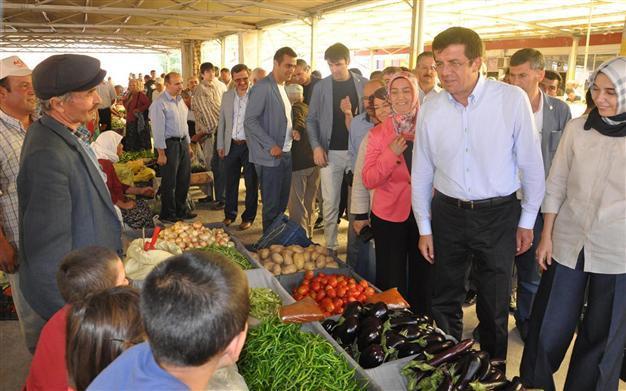Blaming food prices for inflation irresponsible: Economy minister
ANKARA

Nihat Zeybekci visits a market in his hometown of Denizli, Aug. 9. DHA Photo
Blaming the increase in agricultural products’ prices for high inflation is irresponsible as “the real reason is the cost of interest rates,” Economy Minister Nihat Zeybekci has claimed, once again criticizing the Central Bank’s interest rate levels.
“The Central Bank’s holding green pepper and lemon responsible for inflation is missing the real issue,” the minister said, speaking on Aug. 13 at the Agricultural Products’ Export Assessment meeting, which he attended with Agriculture Minister Mehdi Eker.
The minister, who has been strongly urging the Bank to swiftly reduce interest rates, once again used Prime Minister Recep Tayyip Erdoğan’s rhetoric that claims high inflation is an outcome of high interest rates – contrary to orthodox economics theories accepted around the globe.
“Absolutely, agricultural products might be contributing to inflation, it would be wrong to say it is not, but it would be irresponsible to pin the burden on agricultural products,” he said.
The inflation figures made public at the beginning of last week showed consumer prices rose 0.45 percent from the previous month in July, keeping the annual inflation above 9 percent and disappointing the market that was expecting a lower rate in the summer season.
Loss in cropsThe Central Bank and analysts suggest the main reason behind the unexpectedly high inflation is food prices that remained above seasonal norms due to the drought and frost suffered between March and May.
The bad weather caused a serious loss in crops and a remarkable decline in stocks, leading to higher market prices.
“Food prices, in particular, had the worst second quarter in the history of the index due to supply shocks,” the Central Bank, which kept its annual inflation forecast at 7.6 percent for the year-end, said in a quarterly inflation report revealed July 24.
However, in his remarks on Aug. 13, Zeybekci objected to this rationale and claimed the main factor keeping inflation high is the interest rates.
“The real issue is there are people who want to produce, invest, raise employment rates and export. One of the obstacles in front of us is the interest rate costs endured in Turkey,” he said.
He also said “Inflation is important for Turkey, but it is up for debate whether it is crucially important.”
Pledge to keep callsTwo days ago, in a recent interview with Reuters, the minister said the Turkish government will maintain its calls for lower interest rates following Erdoğan’s victory in the country’s first direct presidential election.
“The Central Bank’s interest rates have to come down. The Central Bank has to be ahead of the market. If you follow the market, then the market starts managing you,” he said on Aug. 11.
He also said the Central Bank’s core mandate for price stability should be expanded to include employment and growth, although he added this would not be a top priority for the government in the coming period.
